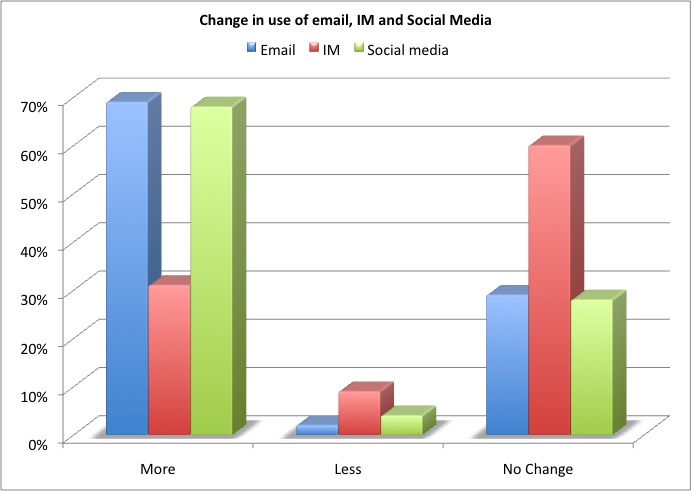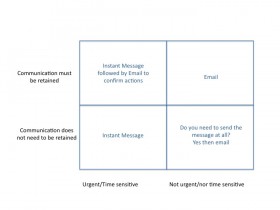Top tips from Mesmo Consultancy (and Associates) on how to save time and improve business and personal performance by ‘Taking Control of your Inbox’ and using proper business email etiquette.
The CIPD annual survey for well being shows that sick leave has fallen by nearly a day. Good news. The bad news is that stress and muscular skeletal problems (back pain RSI and eye strain) are two of the main reason for taking sick leave. Indeed cases of ‘ipad shoulder’ have now been reported. Email overload is still a major contributor to stress levels, not to mention the time spent at the inbox slumped over a keyboard which rises the risk of muscular skeletal problems.
Some postulate that email is in decline and hence we might hope that is email overload and it’s twin sister ’email stress’. The main reason given for the decline in email is the rise in use of social technologies like SharePoint, instant messaging (IM) and alike.
email is the rise in use of social technologies like SharePoint, instant messaging (IM) and alike.
Our recent survey on the ‘state of the inbox’ for the ITDF Autumn Conference revealed that email traffic is far from declining. Mesmo Consultancy like others are witnessing a dramatic increase. Business users now receive on average 77 emails per day which represents a rise of 26% over the last few years. Interestingly however, most feel that only 47% of these emails are necessary. Dealing with the unnecessary emails (excluding spam) is now costing organisations nearer 31 days per person per year in comparison to the 21 we witnessed a few years ago. So much for the push to lean and mean and improved efficiency.
Is your organisation paying too high a price for the pleasure of using email? Click here to check how much email overload is costing you in lost productivity.
So what of all the talk about social technologies being the nirvana to solve all the challenges which email possess? Our study revealed that about half the participants are using such technologies but they are not truly embedded in many as a replacement for email. Discussions at the ITDF supported this finding.

Haystacks by Monet
Social technologies bring with them their own set of challenges not least more emails as alerts to new postings etc. Then there is the information overload as more people feel they must share ever more information. It takes a skilled knowledge worker to pick out and pull in just what is really relevant. It’s akin to finding a needle in a haystack and is a skill few either possess or are taught.
Piling social technologies on top of email is not the solution. It just adds to the information overload and ramps up even further the stress and time we need to spend slumped over our keyboard.
One solution to driving down stress related sick leave is to implement such technologies as part of the information and communications strategy. However users must also be properly educate about when, where and how to use these technologies and email properly. Not surprisingly less than a third had any education and training in how to use effectively email and social technologies. (This is very similar to previous findings.)
We have commented on the effective use of IM and there will be more in the next blog. Meanwhile, we would be delighted to talk to you about how we can help you drive down and out the pernicious 21st century office disease of email overload and the associated stress.
Our current research into the future of email reveals that information overload is increasing. What is your organisation doing to help people use email and social technologies effectively to reduce email and information overload and hence time wasted at the computer?
Tags: email management training, email overload, email stress, future of email, Instant messaging, Mesmo Consultancy, social technologies
I chose to disconnect last week whilst on leave. No email, no social media. Running the business (and me) was delegated to our very able Administrator. We agreed a process to minimise the post vacation email overload. Rules were set before leaving to folder all known lower priority emails (eg newsletters).
Meeting request would tentatively accepted. How often have you as a PA spent time arranging meetings in bosses absence and they return and have different priorities. One executive once said he felt his PA saw her role as filling up his diary with meetings which he and she then had to  undo as his priorities changed. How often does that happen to you when on leave? Used in this context ‘tentative’ takes on a new and useful function.
undo as his priorities changed. How often does that happen to you when on leave? Used in this context ‘tentative’ takes on a new and useful function.
Otherwise, If something was ultra-urgent we agreed she would call/text me.
On the second day sitting having pre-dinner drinks how did I feel watching the three others all with their heads in their iPhones and Blackberrys? Certainly not left out. Rather the reverse: included in the here and now and able to people watch and enjoy the gentle lapping of the waves as I relaxed and stayed calm. I can only image this must be what it’s like for a reformed alcoholic watching others drink whilst they nurse a lemonade.
A huge plus was the extra time to read instead of feeling I should decamp early from the pool and go and deal with the day’s email tsunami. The book was recommended by a colleague. I wanted to email and say how wonderful it was. But what value did it add for either of us? Had I done so there would have been an email chain which wasted both our times and added to the email overload.
Knowing the business was in safe hands was a wonderful feeling. Although one worry was that my personal emails come in on my work address. It is worth separating business and pleasure, but as Steve Jobs famously said he had only one email address. I make this work for me too. There is a Hotmail address but that is only used for signing up for white paper and special offers etc. None of which is life changing if not read for a week.
What of my social diary – golf matches and alike? Our Administrator dealt with any that looked like they required a response. So no lost golf games or party opportunities! Two years ago such arrangements were nearly all done by phone. Now of course it’s email, although some friends (and relatives) say they still prefer to talk. In some ways social engagements were better managed as there was time to think and consider instead of feeling one must make an instant response.
I was tempted to log in during the week and join in when everyone else had their heads in their iPhones etc, but a glass of whisky and the urge evaporated. After all having delegated, what would that say about the trust placed in our Administrator? Furthermore, why did I want to disrupt my calm mind. Also, previously I have made poor decisions when in holiday mode through lack of context and having all the necessary information to hand.
At the airport again the urge to hit connect welled up. As in my previous blogs my advice for dealing with the holiday email tsunami is talk before checking the email to prioritise and save trawling through stuff which does not merit your immediate attention. In my case it would be talk and read the ‘read me first email’ as my first day back in the UK was Saturday. I was two hours ahead of the UK so my briefing email would not be ready until we were in the air. Some food and drink soon took away the urge to log in.
On my return as expected, the junk had been trashed and the remaining messages prioritised.
Not logging in was as to paraphrase the great Diana Athill ‘ like excess cargo which needed to be dumped’. I came back feeling more relaxed and able to see the big picture again. Also an a huge bonus, no post holiday email overload and it was very easy to reach inbox zero on day one of my return.
Of those in the party that did log on. One person was asked why they did so when the manager did not? One said they were paid to be available to their clients at all times and yes, someone did want to meet them on Monday. Could it have waited? Probably yes. Did I miss email, twitter etc? No. In fact it has left me re-assessing the value of some of these tools.
What is your experience of no email days/weeks when on leave?
Tags: email addiction, email free vacation, email management training, email overload, inbox zero
Can Instant Messaging (IM) help to significantly reduce email overload? Over the last few months I’ve been working remotely with a client and using their IM in earnest (via Microsoft Communicator). I was able to catch up with colleagues on business and social matters quickly and without ending up with an inbox full of redundant email chains.
At one point urgent help was needed from a colleague whose status was ‘busy’. A quick message and back came the necessary data with a note that all the other matters would need to wait until our planned conference call later that week. Still the vital data was supplied and work could progress.
Would the same have happened with email? No, as he is a strict disciple of the ‘stay focused’ management school. His new email alerts are off and he only checks his inbox every couple of hour or so. He works on the basis that if it is urgent someone will either call or send him an IM.
Email has been around for just over 30 years and is now seen by many as the default communications channel. But is it really that useful for all electronic communications? Mimecast found only about 30% of emails received are read. Meanwhile the Grossman Group found that middle managers are overwhelmed by email and often spend long hours outside work catching up with their email. But what are all these emails they feel they must read or at least spend time deleting)? We and Grossman found that about 25 to 30% are indeed trivial often either chains (ongoing conversations) or about subjects that are no longer relevant (eg fire alarm is being tested at 11.00am).
Email is but one of a range of communications channels (from face-to-face meetings to text messaging). Is it time to start thinking through how we can use alternatives to email firstly to communicate more efficiently and hence secondly reduce the email overload which is crippling many people and their businesses? Have you checked recently how much time you and your business are loosing through unnecessary (internal junk) email?

For me IM is hugely undervalued as a communications tools. If I were CEO of an organisation (no matter what size) I would not ban email internally as some have done but would implement an IM policy.
All message which do not need to be retained and are time sensitive should be sent by IM and not email as per this matrix.
Are you using any form of social media and IM to reduce the volume of email traffic and improve communications? Click here to participate in our new survey.
Tags: alternatives to email, email chains, email management, email overload, IM, Mesmo Consultancy
 At last week’s Office 2012 show our associate Luke Williams gave a master class on how to use LinkedIn to improve career and business. Here is a copy of the presentation. Click here to download.office 2012 – Getting more from LinkedIn
At last week’s Office 2012 show our associate Luke Williams gave a master class on how to use LinkedIn to improve career and business. Here is a copy of the presentation. Click here to download.office 2012 – Getting more from LinkedIn
Tags: LinkedIn, Luke Williams, Office 2012
One hours training returns about five hour extra productivity. Yet according to a recent survey from the UK Commission on Employment and Skills 40% of UK companies spent nothing on training last year. This supports Mesmo Consultancy’s observations on how poor people’s level of skills is with their email software. Here is the tool which is used most in day-to-day businesses and yet ask people which of the key time saving features they can use such as filters and colour to manage their inbox and on average only 50% know how to use these functions.
Training is the key to improving productivity and competitiveness as has been observed by many including ourselves. Indeed attending a short ninety minute email best practice workshop can help you find up to an extra sixty minutes a day. When was the last time you provided your employees with any email training? Do they use their email software properly to improve productivity or so poorly that they are often the source of unnecessary demands on the IT Help Desk.
Click here to check your level of Outlook IT Fitness and see where you could be saving time. If you need some help call us and we would be pleased to talk through how providing email best practice training (to use both the email and calendar functionality) can improve business productivity.
Tags: email management training, Email training, Outlook IT Fitness